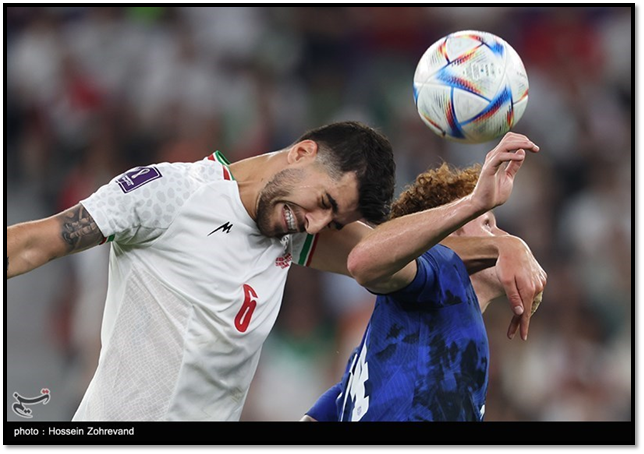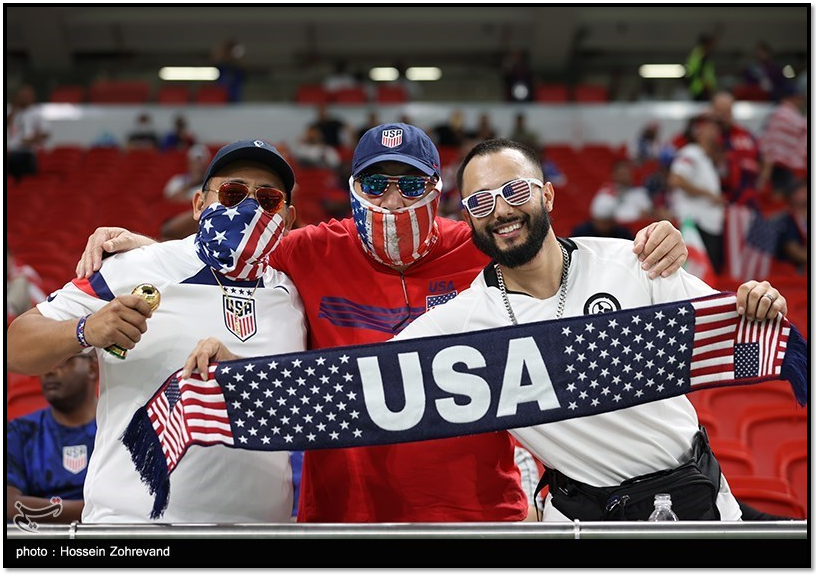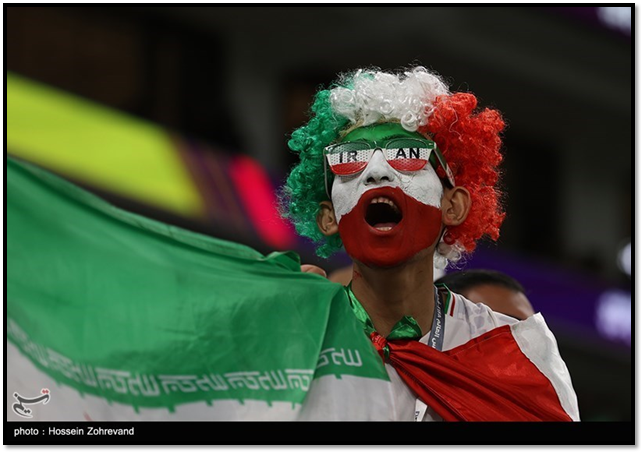The U.S. national team defeated Iran 1-0 on November 29 in the most politically charged match at the 2022 World Cup in Doha, Qatar. The Americans were often on the attack; they took 12 shots while the Iranians only took four. But the game was a nail-biter right until the end. “That was stressful. I think I have less hair on my head now,” Gregg Bernhalter, the U.S. coach, told Fox News after the win.
FINAL:
— U.S. Men's National Soccer Team (@USMNT) November 29, 2022
🇮🇷 IRN 0 - 1 USA 🇺🇸
WE ADVANCE OUT OF GROUP B.#USMNT x @Visa pic.twitter.com/b3wx2bmUCA
Before the game, Iranian players—arms draped around each other’s shoulders—sang their national anthem for the second consecutive game. They had refused to sing along during their first match against England on November 21. Their silence was widely interpreted as a sign of support for the protests back home, which broke out in mid-September 2022.
The stadium echoed with noisy cheers and chants during the U.S.-Iran match—a follow-up to the 1998 World Cup when Iran upset the United States and won 2-1. A 2000 exhibition match in California ended in a 1-1 draw. In Qatar, Americans and Iranians were both draped in their national flags. Iranian fans formed the majority of the crowd in the 44,000-capacity stadium.
Related Material: “History: U.S.-Iran at the World Cup”
Related Material: “Iran’s Protests and the World Cup”
The United States dominated the first half of the match. Christian “Captain America” Pulisic, a midfielder, contorted his body to score during the 38th minute. Iranian goalkeeper Alireza Beiranvand’s knee went into Pulisic’s side. The 24-year-old from Pennsylvania sat out the second half and was taken to a hospital for scans after the game.
Iran did not register a single shot on goal until minute 52, a header that was too high. The Iranian players appeared sluggishly and gave up many opportunities to the Americans, who played relentlessly. The U.S. squad, with an average age of 25 years, was the second-youngest team in the 2022 World Cup.
The U.S. team also played well in the first half of its match against Wales, then played a lousy second half—the game ended in a 1-1 draw on November 21. It also played to a no-score draw against England on November 25. Iran suffered a humiliating 6-2 loss against England, but the team rallied for a 2-0 victory against Wales. So Iran went into the match against the United States with a slight advantage.

Iran played more aggressively in the second half. But the extra nine minutes of stoppage time at the end of the game were the most intense. Iran nearly scored when defender Morteza Pouraliganji headed a free kick that missed wide left. Iranian players later begged for a penalty as a player collided with the U.S. goalkeeper, barely missing a goal that would have tied the game.
“The dream is over with this result,” Iran’s manager Carlos Queiroz said after the loss. “We started to close and stop all the movements of the U.S.” The Iranians made a desperate attempt at a rally in the last few minutes but ultimately came up short. Soccer “always punishes the team that doesn't score,” Queiroz added.
Bernhalter was proud of the U.S. team for holding on to the lead. “We showed what we can do, soccer-wise, in the first half. Second half we showed what we can determination-wise,” he said.
Antonee Robinson showed his class by consoling Ramin Rezaeian and other Iran players 👏https://t.co/SF51dNfNws
— Mirror Football (@MirrorFootball) November 30, 2022
• Possession: United States (51 percent); Iran (49%)
• Shots: United States (12); Iran (4)
• Shots on goal: United States (5); Iran (1)
• Fouls: United States (10); Iran (14)
• Yellow cards: United States (1); Iran (3)
The Iranians, with a total of 14 fouls and three yellow cards, played slightly more aggressively than the Americans, who had 10 fouls and received one yellow card. Some players were injured. But neither team played with animosity. Right back Ramin Rezaeian and left back Antonee Robinson collided when they both jumped for the ball. But Robinson patted Rezaeian afterwards.
As the game ended, the crowd quieted, and U.S. fans and players began to celebrate. Players on both sides fell to the ground as the clock ran out. U.S. players embraced on the field, and Iranians collapsed in exhaustion and disbelief. Iranian players looked on as the U.S. team celebrated. American players consoled Iranians, patting them on the back as both teams milled around the field.
As Saeid Ezatolahi, a defensive midfielder, wept on the ground, four U.S. players gathered to comfort him. Josh Sargent, a forward, embraced him, and forward Tim Weah helped Ezatolahi stand up. “It’s more than just football, Weah told FOX Sports after the game. “The United States and Iran have so many issues politically and I just wanted to show that we are all human beings and we all love each other.” Forward Brenden Aaronson was also moved by Ezatolahi’s anguish. “I could feel the emotion from him on the ground,” he said. “All you want to do is go and console them and tell them that everything is going to be OK. It’s just a human thing.”
“A night of dreams,” Weah said. “I always say it’s us against the world because nobody believed that the U.S. could play good football. So we’re here to show the world.”
The stakes were huge for both countries. The United States needed a win to move on beyond the first round, while Iran only needed a draw. Just as important were the bragging rights of a victory. Iran boasted about its decisive defeat of the United States in 1998—the only other World Cup encounter between the two nations—for the intervening quarter century. The U.S. team did not even qualify for the World Cup in 2018, while Iran won a match but did not advance to the second round.

The game had intense political undertones, with the two nations deadlocked on major diplomatic initiatives—most notably the 2015 nuclear deal—and backing rival political factions across the Middle East. The United States had also condemned and sanctioned Iran for cracking down on protestors at home and providing drones to Russia for use in the Ukraine war.
But the atmosphere among Iranian and American fans was jovial in Doha. “Side by side the Americans and Iranians are putting their differences aside and dancing,” tweeted one spectator on the stadium grounds. Fans, decked out in patriotic gear, posed for photos together. “It has been amazing to see Americans. They are so friendly,” Yas, a 14-year-old from south-central Shiraz, told the Associated Press.
Inside the stadium, before the game, one man wearing an Iranian flag as a cape and an American man wearing a U.S. jersey and hat bumped fists for a photo. American fans stood for Iran’s national anthem, and Iranian fans remained standing for the U.S. national anthem.
Ironically, the main tension was between different groups of Iranians. People who expressed support for the protests, sometimes by carrying posters or wearing t-shirts with political slogans, were reportedly harassed by other Iranians. “I feel like I am surrounded by IRGC [Islamic Revolutionary Guard Corps] agents,” Mehrdad, from Arizona, told the Associated Press. “Everybody’s watching you.”

Security officials also threatened players with retaliation to prevent displays of support for the protests. The IRGC reportedly called on lawmakers to draft legal consequences for any players who challenged the government. IRGC officers met with players and threatened to detain and torture their family members if they spoke out against the government or did not sing along to the anthem.
Tensions flared ahead of the match when the U.S. soccer federation altered Iran’s flag in social media posts on November 26. It excluded the tulip-shaped emblem representing the Muslim declaration of faith, “There is no god but God.” The flower is a symbol of martyrdom in Shiite Islam.
Iranian media condemned the politically charged posts. They also called for the expulsion of the U.S. team from the tournament for violating FIFA regulations. The posts were later deleted. The U.S. federation said that it posted the altered flag for 24 hours in support of “the women in Iran fighting for basic human rights.” On November 28, Berhalter apologized. The “players and the staff knew nothing about what was being posted,” he said.
Iranian journalists had lambasted Berhalter and U.S. captain Tyler Adams during a press conference on November 28. They demanded to know why Berhalter hadn’t called on the United States to decrease its naval presence around Iran and why Washington restricted Iranians from visiting. They criticized Adams for pronouncing “Iran” incorrectly and asked him about playing for the United States despite its “discrimination against black people.” Adams apologized for mispronouncing Iran and countered, “There’s discrimination everywhere you go. In the U.S. we’re continuing to make progress every single day.”
USMNT players have been asked questions about the political context surrounding their match vs Iran
— FOX Soccer (@FOXSoccer) November 29, 2022
Yesterday, Captain Tyler Adams had this exchange with an Iranian reporter pic.twitter.com/Y7Q9wV7lS9
Despite the tensions, both coaches expressed respect for each other’s teams during pre-game press conferences. Queiroz said that the United States had the “best performances” of the other teams in Group B. When asked about the flag incident on social media, Quieroz said that Iran could still win despite “mental games.”
Berhalter echoed the sentiment of mutual respect. “I like what Iran has done so far, especially in the last game [against Wales], [they showed] a lot of commitment, really good counter-attacking, and we expect it to be a hotly contested game and we'll be ready for it,” he said. He had downplayed the political significance of the game in the week leading up to the match. “I envision the game being hotly contested for the fact that both teams want to advance to the next round—not because of politics or because of relations between our countries,” he said. “We're soccer players, and we're going to compete and they're going to compete, and that's it.”
ROUND OF SIXTEEN 🇺🇸 pic.twitter.com/DqWp5S7gvR
— U.S. Men's National Soccer Team (@USMNT) November 29, 2022
Hours before the game in Doha, Secretary of State Antony Blinken said that he was looking forward to a “very competitive” match. But he deferred from injecting politics into the decisive match when asked about its potential geopolitical implications. “When it comes to soccer, or to football, as it’s sometimes more properly known, let’s let the athletes do their thing,” he told reporters in Romania. “I don’t think there are any particular geopolitical aspects to this other than that we have what should be a competitive game, and let’s let the game speak for itself.”
Blinken also reflected on the intersection of the World Cup match and the protests in Iran. "When it comes to protests,” he added, “our position is the same everywhere, which is that we support the right of people everywhere to peacefully protest, to make known their views, their concerns, and their frustrations.”
Photo Credits: Tasnim News Agency (CC BY 4.0); IRNA (CC BY 4.0)
Garrett Nada, managing editor of The Iran Primer, and Connor Bradbury, a senior program assistant at the U.S. Institute of Peace, compiled this report.
